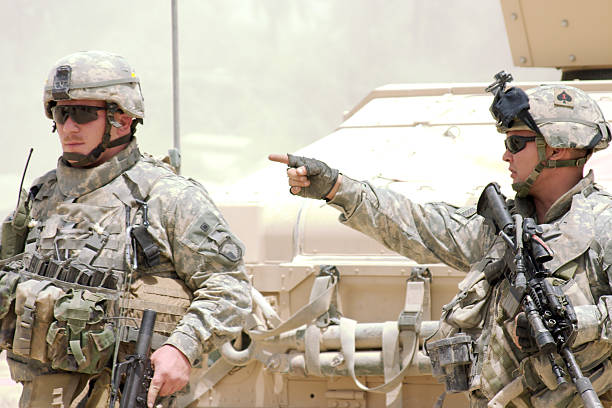A major life decision, enlisting in the military should not be rushed. There are many benefits or reasons why you should join the military if you’re one of the thousands contemplating it, but you also can’t ignore the growing number of drawbacks
Let’s look at the disadvantages of joining the military.
List of the Disadvantages of Joining the Military
Before raising your right hand, it’s crucial to comprehend both the benefits and drawbacks of serving in the military.
We’re giving a straightforward list of drawbacks to enlisting in the military, in no particular order.
Physical Fitness Standards
Being physically fit is also necessary because military personnel are expected to be prepared at all times. If you weigh more than a specific amount, you can be declared unsuitable for duty. You can also be ruled unfit for service if you can’t run, do pushups, sit ups, and pass the physical test.
Some people desire to serve the nation in some capacity but are unable to satisfy the physical requirements of such a physically taxing position.
Expect to undergo the most rigorous physical and psychological testing of your life if you decide to join any branch of the U.S. military.
Beginning in boot camp, the pressure continues throughout service. Unquestionably, soldiers are physically fit, but not everyone can serve in that capacity.
Difficulty for the Families
The United States military is not an easy career for families, despite how often you hear this statement.
The profession necessitates hours, weeks, or months away from home, just as being a police officer or firefighter. Both the person serving and the rest of the family struggle with these absences.
You may be sure that enlisting in the American Army requires serious dedication and sacrifice. Some troops miss out on many family events and the upbringing of their children
Risk and Danger
Serving in the military can be a risky job with long-term consequences. According to Brown University, the price of war is high for American veterans and their families.
Due to the physical and psychological harm they experience in combat zones, many veterans from Iraq and Afghanistan will live with a disability. At least 970,000 veterans are disabled in some way.
No Quitting Military Service
If you work in the private sector, you may be aware that all states in the US, with the exception of Montana, are known as “at-will” states under US labor law.
When an employee has an at-will employment relationship, their employer is free to fire them whenever they want, for any reason—aside from those that are illegal—or for no reason at all. In addition, there are no legal repercussions if an employee quits their employment at any time, for any reason, or for no reason at all.
It is unfortunately not possible to quit the military. There is no easy way to leave the military. You are ethically and legally required to uphold your pledge once you raise your right hand, take the oath, and sign on the dotted line.
If you are physically or mentally unable to execute your tasks, the military may release you for a variety of reasons. Don’t even consider going AWOL and completely leaving the service. You’ll be fired dishonorably, lose all of your pay, be demoted to the lowest enlisted grade, and spend time in jail.
If you are given a dishonorable discharge, you forfeit all veteran benefits and it will be very difficult for you to find employment. Therefore, be sure this is what you want to do for at least the next four years of your life before enlisting in the military.
Rank
The chain of command system is used in the military just like it is in the civil sector. Your military rank does not correspond to your age. If a 21-year-old has a greater rank than you, a 28-year-old, you must obey their instructions.
There will almost certainly always be someone in a higher position than you, and regardless of their age, you must show respect for them.
Physical Appearance and Grooming
When it comes to appearance, the military has high expectations. You must appear and act the part because you represent the military as a whole, especially when you are in uniform.
Face hair, for instance, is prohibited, with the exception of a little mustache. For guys, having long hair is not an option. From the length of your fingernails to the way your hair is styled, the military has rules.
While in uniform, long, dangling earrings are prohibited, and tattoos must be covered. Your lifestyle outside of uniform is also influenced by your physical appearance.
While you cannot consume alcohol or smoke while wearing a uniform, you are still held to a high level when not wearing one.
Medical Healthcare
Free medical care ought to be a perk, right? On the surface, yes. A deeper inspection reveals that there may possibly be a drawback to this.
You aren’t allowed to pick your own doctor in the military. Under Tricare, a physician who is referred to as a primary care manager is allocated to you and your dependents. Although you can’t choose your own supplier, you can always ask to switch PCMs.
Little Control Over Where You’re Stationed
Even though the United States Army will try to station soldiers according to requests, there is no certainty, particularly if you are a new member of the army.
You must enter the military knowing that you will have little to no choice over where you live.
It can entail being stationed in a dangerous region or a war zone. It’s a commitment you’ve made to the American Army.
Numerous Disciple
The American military is the most orderly workplace you will ever come across. For everything, they have regulations and recommendations. Some of which you might not quite concur with.
A democracy is not the Army. There is a hierarchy of soldiers, and the more powerful soldiers get to decide the regulations (obviously within reason).
In addition to being able to be punished and told not to argue, prospective recruits should be prepared for a lack of privacy and, depending on where they are sent, possibly difficult living conditions.
May See More Active Conflict
While some people enlist in the military wanting and embracing conflict, it is not for everyone.
After the U.S. Marines, usually, the first to go into a dangerous situation is the U.S. Army. It sees its own fair share of dangerous situations.
In a time of war, the U.S. Army is often on the ground, more prone to attacks than other branches like the U.S. Navy or U.S. Air Force.
Wife and Children Will Always Be Worried
Your wife and your children will frequently worry about your safety, even if you are able to keep your marriage together in the long run.
In fact, a lot of women worldwide worry that they may learn that their spouses passed away during military activities.
In turn, if your family worries nonstop, this can also cause severe emotional stress and mental health issues for your family.
Difficulty in Making Future Plans
In general, it will be challenging for you to make future plans if you join the military.
It will be challenging for you to buy a property in a specific area or to commit to other long-term decisions because you won’t know where you will be living in a few months or years.
The Job Can Be Demanding
Military work can be mentally taxing in addition to being physically taxing.
So, don’t expect your military career to always be straightforward.
You’ll probably go through times when you want to give up, but you’ll need to persevere occasionally.
This May Lead to Mental Issues
Long-term mental health problems among many troops is another drawback of entering the military.
In truth, a lot of troops had terrible experiences while serving, and they frequently found themselves unable to handle everything they were required to perform.
Consequently, be sure to consider this information when deciding whether or not to enlist in the military.
Lack of Freedom
In general, your overall level of freedom will be rather constrained if you join the military.
In fact, you will want authorization from the military for a variety of daily activities in numerous nations throughout the world.
Even the army may need to provide its approval before you may be married in some nations. Thus, enlisting in the military has a significant impact on your personal life.
Huge Commitment
The decision to enlist in the US military is a significant one. You sign a contract when you enlist in the military that specifies how long you’ll serve.
This agreement is a binding legal document that cannot be revoked or modified.
Although it can range from two to nine years, the median length of commitment is between four and five years. You are contractually required to serve for the specified period of time once you have signed this contract, and early discharge could result in severe legal repercussions.
Racism in the Military
The military has anti-racism policies in place. Despite having an authoritarian framework, it has failed.
During the current wars, Arabs have been called “towel-heads” or “sand-niggers,” and there have been rumors of cross-burnings and KKK gatherings on military property.
For instance, during the Persian Gulf War, white soldiers were more likely to stay in the United States or be stationed elsewhere while half of the deployed forces were black.
The few employment options in the military mostly benefit educated, white personnel. Only 11% of the officers are people of color, despite the fact that one-third of enlistees are.
Enlistees of color typically receive combat-related occupations requiring less skill. Unfairly many African Americans and Latinos are facing courts-martial and receiving unfavorable discharges
What Happens When You Leave the Forces
Soldiers are frequently released from service without the resources to continue in civilian life and without any marketable skills.
Veterans who are underqualified and lack the necessary skills for civilian jobs are swarming the unemployment lines. Veterans make up a sizable portion of the homeless and prison populations and many of them experience prolonged unemployment.
For the duration of their careers, even those who are gainfully employed will lag behind their civilian colleagues in terms of pay and progress. You cannot catch up to the rest of the world once you have served in the military.
Additionally, the military supports you in other ways. The idea of proving oneself, gaining discipline, and being “all you can be” is a big part of the appeal.
You might wish to keep your “army pride” with you for the rest of your life. But keep in mind that this is only a portion of the story. Violence cannot be committed by anyone and leave them either unharmed or unconcerned.
You will forever be associated with the destruction you encouraged. You might never be able to forget the people you killed if the United States engages in war.
Some people find it difficult to endure the burden of these recollections. Veterans of the Vietnam War have a much higher suicide rate than the general population.
FAQs
What is a military contract’s duration?
A significant commitment, joining the military should not be taken lightly.
The majority of first-term enlistments call for a commitment to two years of inactive service (Individual Ready Reserve, or IRR) and four years of active duty.
Nevertheless, the services also have two, three, and six-year active-duty or reserve enrollment plans.
What is the military’s main issue?
Military Injuries
As the single biggest health issue facing the U.S. military, musculoskeletal injuries brought on by both acute (sudden) accidents and chronic, recurring pressures to the body (overuse) have been cited as the following reasons: Every year, around 50% of military personnel sustain one or more injuries.
Is serving in the military safe?
It can be a risky job.
When assessing the pros and drawbacks of military duty, this is most likely your most crucial factor.
Even if you’re not engaged in direct combat, you could still be exposed to extremely dangerous situations depending on where you’re stationed and what rank you hold in the military.
Who leaves the military and why?
Some employees leave when they reach retirement age or are medically forced to, while others do so sooner or by choosing voluntary severance choices.
Service leavers are likely to have a variety of needs depending on the experiences and skills they gained while serving in the military.
What should you never do in the military?
Never publicly criticize the Army or a leader. Never “over the heads” of superiors; don’t go above them in the hierarchy. Please never apologize.
Never “wear” the status of a superior by stating something like, “The First Sergeant wants this done now,” when in fact the First Sergeant made no such statement.
Conclusion
Military service includes a number of drawbacks. Life in the military can be difficult without the right direction and assistance. Before devoting your life to at least 4 years of military service, be sure to weigh all of your options.
In the end, you must weigh all the disadvantages of joining the military and enlisting on your own in order to make the best choice possible for your particular situation. Check out the 25 Top Military Benefits After 4 Years Of Services.


